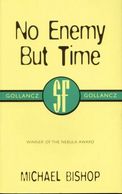
| Publisher: | Gollancz |
| Copyright: | 1982 |
| Printing: | 2000 |
| ISBN: | 0-575-07096-X |
| Format: | Trade paperback |
| Pages: | 397 |
Joshua Kampa has, for his whole life, had such vivid and memorable dreams of prehistoric Africa and the immediate precursors of Homo sapiens that he's certain he's seeing what really happened. He's been chosen to participate in the White Sphinx project, an experiment to use his dreams to send him back in time and observe first-hand the origins of the human race. The White Sphinx project has become a matter of national pride for the African nation of Zarakal which likes the idea of claiming to be the origin of the human race.
At the start of the book, Joshua is undergoing survival training in a national park in a remote portion of Zarakal in preparation for his journey. From there, No Enemy But Time alternates between the story of Joshua's journey into the past and the story of his life as the son of a mute Spanish prostitute and a black US serviceman, fostered to a US family. His journey involves a lot of detailed description of the behavior of a tribe of Homo habilis and his emotional reactions to finally being in the world he's seen in dreams for so many years. His life story starts with his parents and adoptive parents and moves into his struggle to do something with his dreams.
The characters grabbed me at the start of the story, and Joshua does remain interesting throughout. He tells the story of his journey into the past in a detached, cool first person perspective, but his emotional hangups and quirks slip out around the edges and draw the story towards a psychological exploration of his motives and reactions to being out of place in both his present and the distant past. The interludes of his life story provide background for a growing picture of his character and motivation for his actions. Unfortunately, for far too much of the book, working out those connections is all that this story offers.
I found the extended trip into the African landscape of the distant past painfully boring. It may appeal more to those who like survival stories or who know enough about theories of human evolution to pick up the science embedded in the descriptions, but nothing that happens seems endowed with much oomph. There is a plot arc of sorts, a love story that I found varyingly disturbing and incomprehensible, and a few significant events, so it's not fair to say that nothing happens. However, it felt, reading it, like nothing happened. The detached tone, my lack of sympathy with Joshua's personal obsessions, and a lot of simple retelling of daily life for a hunter-gatherer tribe makes for a lot of verbiage that held my attention only insofar as I enjoyed piecing together Joshua's motives.
The backstory of Joshua's life is more interesting, but since we know what it's leading up to and is more supporting material than a plot in its own right, it too lacks narrative drive. Bishop does a good job with the characterization of Joshua's relationship with his mother. It's mildly amusing in the standard "rooting for the underdog" sense to see Joshua lever his way into the scientific community without formal training. And, towards the end of the backstory when Bishop provides more of the details of Joshua's talent, there are bits of interesting speculation. But never did these sections of the book rise above mild entertainment for me.
The end of the book is an exception. Bishop introduces a satisfying plot twist near the end of the book and entwines it with the climax and resolution of the emotional issues that had been building through the book. None of the characters are stupid, reconciliations are difficult and realistic, and Bishop in the concluding coda introduces one of the better characters in the book. That coda and the two chapters that precede it stood head and shoulders above the rest of the book for me, and they are built upon and grounded by the slow character construction of the rest of the book.
As satisfying as that conclusion is, though, I don't think the journey was worth it. I'm not interested in the ancient world that takes up most of the book, and while Joshua is a rich and twisty character to study, he's not compelling enough to carry the novel essentially unaided. I wanted to be more emotionally invested in the story, to be drawn in by narrative energy, and I wasn't. It's not that it's essentially a character study and not an adventure; I've read character studies that have had me on the edge of my seat. It's more that most of the direction of the story is obvious, the characters are interesting but not compelling, and it never worked up a convincing head of steam. If the whole book were like the first two chapters and last three, I'd be recommending it; as is, be cautious of it unless you're interested in a slow and description-heavy portrait.
Reviewed: 2007-02-20